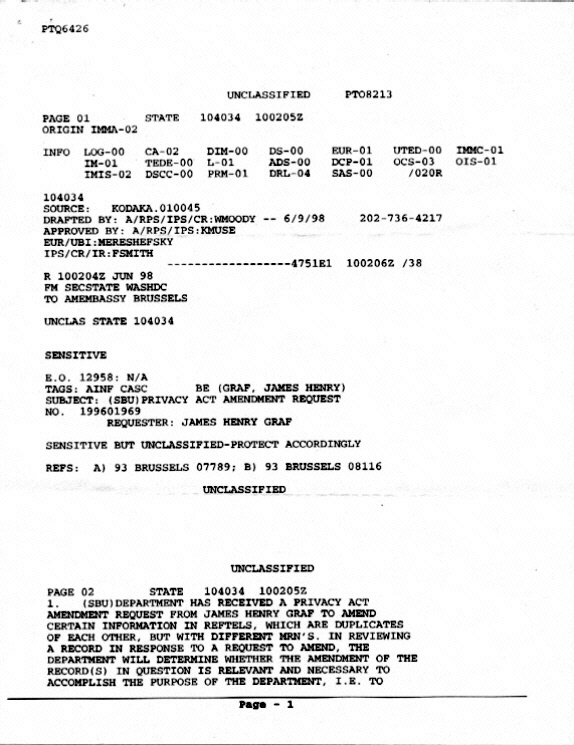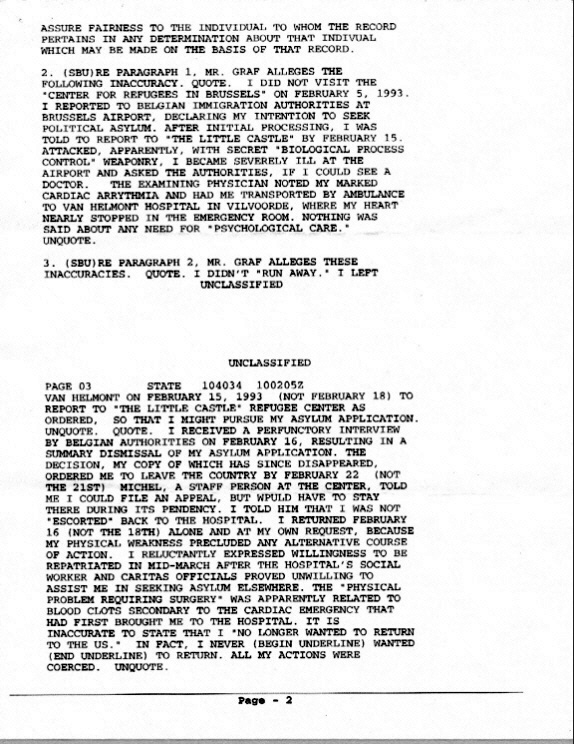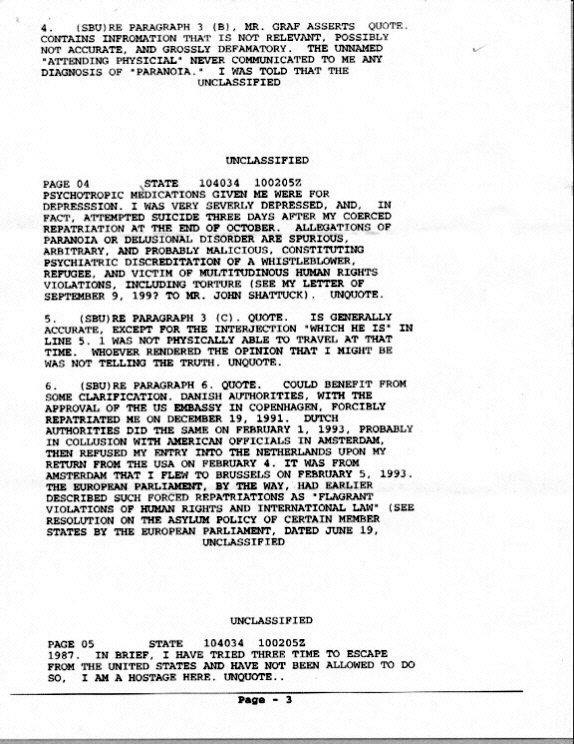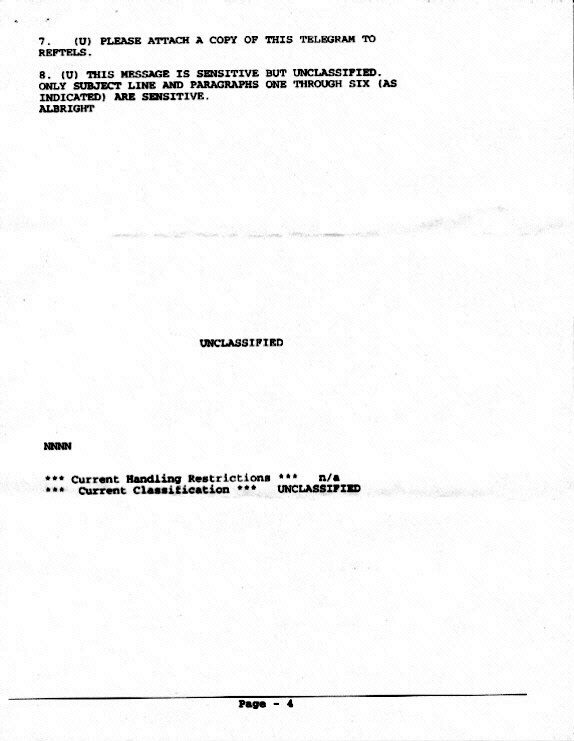This is the telegram of correction that the US State Department agreed to attach to the defamatory document known as Brussels
07789. It omits several significant details.
Beneath the scanned pages, you will find my corrections as I suggested them, and a few conclusions that one may reasonably draw.




This doesn't tell the whole story!
Below are my corrections, as submitted to the State Department, together with the relevant segments of Brussels 07789. The text appearing in dark red was not included in the telegram of correction shown above.
Brussels 07789 reads:
"1. Am. Cit James Henry Graf (DOB March 21, 1942, New Jersey) has been hospitalized in Vilvoorde, Belgium since last February. Upon his arrival in Belgium on February 5, 1993, Graf visited the center for refugees in Brussels and applied for political asylum. Initial interviewers there determined that he needed physical and psychological care. They sent him to a local hospital where he remains at Belgian Government expense."
My correction:
* Paragraph 1 contains the following inaccuracy. I did not visit the "center for refugees in Brussels" on February 5, 1993. I reported to Belgian immigration authorities at Brussels Airport, declaring my intention to seek political asylum. After initial processing, I was told to report to "The Little Castle" by February 15. Attacked, apparently, with secret "biological process control" weaponry, I became severely ill at the airport and asked the authorities if I could see a doctor. The examining physician noted my marked cardiac arrythmia and had me transported by ambulance to Van Helmont Hospital in Vilvoorde, where my heart nearly stopped in the Emergency Room. Nothing was said about any need for "psychological care."
Brussels 07789 reads:
"2. On February 18, Graf ran away from the hospital to revisit the center for refugees. He wanted to discover whether a decision on his refugee status had been made. The application was denied; Graf was issued a legal order to leave Belgium by February 21. Escorted back to the hospital on February 13, he has remained there ever since. Sometime in mid-March, he agreed to voluntarily return to the U.S. Consular records show that Belgian authorities approached the embassy for repatriation information at that time. Graf subsequently developed a physical problem requiring surgery. After recovering from the surgery he no longer wanted to return to the U.S. Since Graf refused USG assistance, no further consular action was taken until a few days ago."
My correction:
* Paragraph 2 contains these inaccuracies. I didn't "run away." I left Van Helmont on February 15, 1993 (not February 18) to report to "The Little Castle" refugee center as ordered, so that I might pursue my asylum application.
In comparison with Dutch and Danish refugee reception facilities, conditions there were deplorable, apparently intended to discourage asylum-seekers, and personal security was almost nil. After a harrowing night and a long wait in a crowded room, I received a perfunctory interview by Belgian authorities on February 16, resulting in a summary dismissal of my asylum application. The decision, my copy of which has since disappeared, ordered me to leave the country by February 22 (not the 21st). Michel, a staff person at the center, told me I could file an appeal, but would have to stay there during its pendency. I told him that I was not well enough to stay there and begged to be sent back to the hospital. Michel arranged my readmission.
I was not "escorted" back to the hospital. I returned February
16 (not the 18th) alone and at my own request, because my physical weakness
precluded any alternative course of action. I reluctantly expressed willingness
to be repatriated in mid-March after the hospital's social worker and Caritas
officials proved unwilling to assist me in seeking asylum elsewhere. The
"physical problem requiring surgery" was apparently related to blood clots
secondary to the cardiac emergency that had first brought me to the hospital.
It is inaccurate to state that I "no longer wanted to return to the US."
In fact, I never wanted to return. All my actions were coerced.
Brussels 07789 reads:
"3. Hospital social services workers approached the embassy regarding Graf on June 28. Consular staffers called at the hospital June 29 and talked to the social worker, the attending physician, and Graf. They gleaned the following information:
"(A) The social worker stated that the situation cannot continue as Graf cannot stay indefinitely in the hospital at Belgian government expense. She asked whether the embassy could have Graf returned to the U.S., with (or without) his consent. Consular staffers replied that the embassy could not force an American citizen to return to the U.S against his/her will and that the USG could not and would not pay for Graf's medical expenses.
"(B) Attending physician stated that Graf suffers from paranoia and that his psychose are aimed at official U.S. Government agencies (CIA - FBI) which Graf believes have persecuted him since 1982. The physician opined that Graf’s mental condition is chronic and requires continuous treatment. His condition in Belgium is now stabilized. The attending physician could not say if treatment in the U.S. would be more beneficial under the circumstances (the source of his paranoia is U.S. - related);
"(C) Consular staffers discussed the possibility of applying for assistance to return to the U.S. with Graf. Graf unequivocally stated that he would never/never want to return to the U.S. He stated that as soon as he is able to travel (which he is), he would seek assistance from refugee organizations (probability Caritas) to travel and establish residence in a German-speaking country."
My correction:
* Paragraph 3 (B) contains information that is not relevant, possibly not accurate, and grossly defamatory. The unnamed "attending physician" never communicated to me any diagnosis of "paranoia." I was told that the psychotropic medications given me were for depression. I was very severely depressed, and, in fact, attempted suicide three days after my coerced repatriation at the end of October. Allegations of paranoia or delusional disorder are spurious, arbitrary, and probably malicious, constituting psychiatric discreditation of a whistleblower, refugee, and victim of multitudinous human rights violations, including torture (see
my letter of September 9, 1997 to Mr. John Shattuck).
* Paragraph 3 (C) is generally accurate, except for the interjection "which he is" in line 5. I was not physically able to travel at that time. Whoever rendered the opinion that I might be was not telling the truth.
Brussels 07789 reads:
"6. During 6/29 interview, Graf stated that he had been `kidnapped' by the American authorities in Denmark on December 19, 1991 and Amsterdam on February 1, 1993. Could these allegations be a reference to visits to your offices and/or repatriation applications."
My correction:
* Paragraph 6 could benefit from some clarification. Danish authorities, with the approval of the US Embassy in Copenhagen, forcibly repatriated me on December 19, 1991. Dutch authorities did the same on February 1, 1993, probably in collusion with American officials in Amsterdam, then refused me entry into the Netherlands upon my return from the USA on February 4. It was from Amsterdam that I flew to Brussels on February 5, 1993 (the ticket has since disappeared).
The European Parliament, by the way, had earlier described such forced repatriations as "flagrant violations of human rights and international law" (see Resolution on the Asylum Policy of Certain Member States by the European Parliament, dated June 19, 1987). In brief, I have tried three times to escape from the United States and have not been allowed to do so. I am a hostage here.
![]()
One may reasonably draw the following conclusions:
According to the US Department of State, Belgian authorities deliberately misrepresented the cause and circumstances of my hospitalization in a possible attempt to confuse my identity with that of an unruly and deranged asylum-seeker. They carefully avoided mention of the cardiac arrhythmia and secondary thrombotic condition that nearly killed me.
An "attending physician" who remains unidentified described me as "paranoid" simply because I feared persecution in the USA on the basis of my political beliefs and the free exercise of my rights, simply because I was seeking political asylum! "Additional Comments Regarding Dutch Court Decision" and "Here's
How It All Came About" demonstrate that my fear of persecution on the
basis of political beliefs was eminently well-founded.
Hospital social workers, who could have and should have advocated for me in my attempt to obtain asylum, instead asked the US Embassy to help them commit the human rights crime of refoulement. On one of my first trips to the lobby of Van Helmont Hospital in February, 1993, I had heard one of these social workers talking on the phone about "Jalilah," one of the two young girls that American agents had used as prostitutes at the Dutch refugee camp in Rijsbergen. I later saw Jalilah at the hospital. Hospital staff must have known about the scandal!
The State Department chose not to include in its telegram of corrections the deplorable conditions I encountered at the "Petit Chateau," the medical necessity of my return to the hospital, or the fact that somebody stole my copy of the negative asylum decision, along with the airline ticket representing my flight to Brussels from Amsterdam. Why did the State Department see fit to omit these details? Is the answer -- are the many answers -- to be found in the still-classified documents pertaining to me that lie in its files?
Detention and Coercion in Belgium
Psychiatric Abuse and Discreditation in Belgium